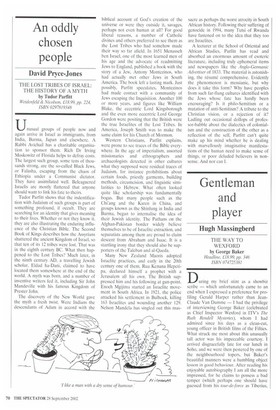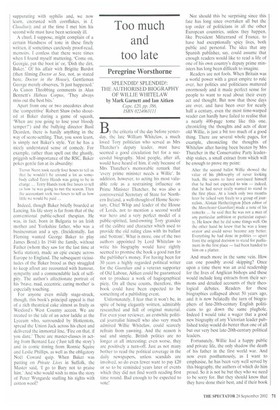Gentleman and player
Hugh Massingberd
THE WAY TO WEXFORD by George Baker Headline, £18.99, pp. 346 ISBN 074725381 During my brief stint as a showbiz scribe — which unfortunately came to an end when I expressed a preference for profiling Gerald Harper rather than JeanClaude Van Damme — I had the privilege of interviewing George Baker (celebrated as Chief Inspector Wexford in ITV's The Ruth Rendell Mysteries), whom I had admired since his days as a clean-cut, young officer in British films of the Fifties. What struck me most about this unusually tall actor was his impeccable courtesy. I arrived disgracefully late for our lunch in Soho, and we were then pestered by one of the neighbourhood topers, but Baker's beautiful manners were a humbling object lesson in good behaviour. After reading his enjoyable autobiography I am all the more impressed, for he claims to possess a bad temper (which perhaps one should have guessed from his tour-de-force as Tiberius,
suppurating with syphilis and, we now learn, encrusted with cornflakes, in I, Claudius); and at the time I met him his second wife must have been seriously ill.
A churl. I suppose, might complain of a certain blandness of tone in these finely written, if sometimes carelessly proof-read, memoirs. I confess that there were times when I found myself muttering, 'Come on, Georgie, put the boot in' or, 'Dish the dirt, Baker,' Of his affair with Brigitte Bardot (then filming Doctor at Sea, not, as stated here, Doctor in the House), Gentleman George merely observes, 'It just happened.' As Canon Throbbing comments in Alan Bennett's Habeas Cotpus, 'They always miss out the best bits.'
Apart from one or two anecdotes about the 'competitive' Robert Shaw (who shouted at Baker during a game of squash, 'When are you going to lose your bloody temper?') and the bullying director Basil Dearden, there is hardly anything in the way of score-settling. That, you soon learn, is simply not Baker's style. Yet he has a nicely understated sense of comedy. For example, rather than spell out the ghastly, priggish self-importance of the RSC, Baker pokes gentle fun at its absurdity:
Trevor Nunn took nearly four hours to tell us that he wouldn't he around a lot as somebody called Terry Hands was going to be in charge ... Terry Hands took five hours to tell us how he was going to run the season. Then the accountant took two hours to tell us how little we would he paid ...
Indeed, though Baker briefly boarded at Lancing, his life story is far from that of the conventional public-school thespian. He was, in fact, born in Bulgaria to an Irish mother and Yorkshire father, who was a businessman and a spy. (Incidentally, Ian Fleming wanted George Baker to play James Bond.) In 1940 the family, without Father (whom they saw for the last time at Sofia station), made an epic escape across Europe to England. The subsequent vicissitudes of the Baker brood as they struggled to keep afloat are recounted with humour, sympathy and a commendable lack of selfpity. The author's affectionate portrait of his 'brave, mad, eccentric, caring mother' is especially touching.
For anyone even mildly stage-struck, though, this book's principal appeal is that of a rich theatrical cake almost as fruity as Wexford's West Country accent. We are treated to the tale of an actor !addle at the Lyceum who, surrounded by Hottentots, spread the Union Jack across his chest and delivered the immortal line, 'Fire on that, if you dare.' There are master-classes in acting from Bernard Lee ('Just tell the story') and in comic timing from Ronnie Squire and Leslie Phillips, as well as the obligatory Noel Coward quip. When Baker was putting on Private Lives in Suffolk, the Master said, 'I go to Bury not to praise him.' And who would wish to miss the story of Peter 'Wyngarde stuffing his tights with cotton wool?



































































































 Previous page
Previous page